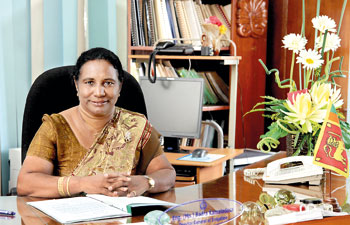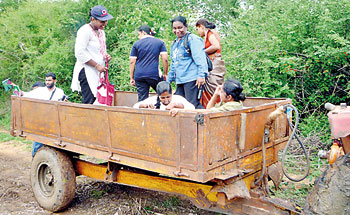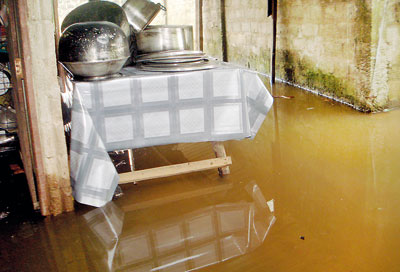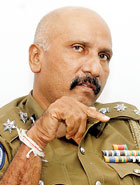She rules where men mostly tread
Another male bastion falls. For the first time ever, in 112 years, the Department of Irrigation will be headed by a woman.
Engineer Badra Kamaladasa, 57, signed the book at 7.40 in the morning on Friday and reported to the Secretary of the Irrigation and Water Resources Management Ministry, Ivan de Silva, that she is taking up duties as Director-General (DG).

Badra Kamaladasa at her office after assuming duties at a simple ceremony. Pic by M.A. Pushpa Kumara
Portraying her well-grounded values which have helped thousands of farmers across the country in this vital sector, there was no tamasha, pomp or pageantry, as she in all simplicity sat in the chair that 32 men have occupied before.
The transition was marked only by the lighting of the traditional oil lamp and distribution of kiribath, that too brought by Badra, among her dedicated staff.
For Badra, who has made numerous arduous trips out of Colombo, to clamber over rocks to peer at a dam, for dams have been her forte or walk through muddy fields to see irrigation channels, it is a natural progression of her 33-year career at the Irrigation Department.
Setting her sights on the topmost post never occurred to her, as she went about her daily work, meeting not only most of the 5,000 men and women who formed the cadre of the department but also thousands and thousands of farmers. Of the 240 engineers in the department there are only 60 women.
It is a reticent Badra that Sunday Times met last week. Gentle prodding reveals her childhood. The eighth in a family of 13 (there are only two girls amidst all the boys), Badra as a little girl studied in schools in Ratnapura including Alupola Vidyalaya, being taken along by her parents whenever they went on transfer.
Her father was a Headmaster and her mother a teacher. From Grade 5 to the Ordinary Level, Badra whose “hobby” was mathematics, studied at Ferguson High School at Ratnapura, later moving to Dharmapala College at Pannipitiya and finally sitting the Advanced Level (AL) examination from Seevali Central College, Ratnapura.
“My pet subject was math,” says Badra, recalling how when she got the textbooks for the new year, she would grab the mathematics book and do all the sums, long before she was taught by her teacher. The environment at home was also math, with “Loku Aiya teaching all the younger ones math”.
There was never any doubt about what she would take up at the ALs. Two of her brothers were already engineers and biology was never an option, she smiles.
So it was to do engineering that she entered the University of Moratuwa way back in 1974, where in her batch of about 150, there was only a handful of women, 12 to be exact. University was also the place where she met her soul-mate, another engineering student, Nishantha Kamaladasa, whom she married once they both passed out from campus.
Nishantha is the Chief Executive Officer of the Distance Learning Centre, having secured a management degree over his engineering qualification.
Now the parents of three grown-up sons, the eldest following them and taking to materials engineering, the second studying medicine in Russia and the third psychology at an institution in Colombo, Badra’s life is fulfilled.
Memories flow of how she worked six months at the Urban Development Authority soon after passing out as an engineer. Then it was a choice between coast conservation and irrigation, both of which she loved. She was 25 years old and the balance tilted in the direction of the latter.

Badra on a field trip in a tractor
It was meant to be, says Badra with all humility. Working for a few years in Galle on the Gin Ganga scheme and Moneragala, although she came to the Head Office, the outstation trips took her to the far corners of the country. She was not only game but also agile at climbing trees and walking the difficult route, growing up among so many brothers.
“I was, however, able to do my duty because Nishantha’s family came to the fore to take care of my children while I was out,” she says with deep gratitude to her in-laws. Her role models have been her mother, mother-in-law and a Ferguson Principal, Pearl Perera.
Those were also the days when on long trips, going into interior villages, toilets, especially for the womenfolk were a scarce commodity. “But now that has changed,” she is quick to point out, adding that the farmers are also very knowledgeable and they will not accept whatever is said, without questioning it closely.
Badra’s passion comes out strongly when she explains that most people in Colombo do not know the value of water – how important it is to those living outside.
“Those out of Colombo, view water in a different manner. For two-thirds of the people, their livelihood depends on water. If there is no water, their lives are over,” says Badra. “For us it would be like losing our jobs.”
That’s why Badra sees the irrigation systems not just as something made of earth and concrete – but “living beings”. Most people will see tank bunds as “pas gadak” (a mound of soil) but not Badra. Whenever she sees water flowing through a new irrigation system, the tender shoots of paddy or golden-eared paddy bent heavily in the wind, her cup overflows and she exults in a deep sense of satisfaction.
“These feelings,” according to this veteran woman engineer, “are not exclusive to me. Everyone in this department feels the same.”
Paying tribute to all those who have toiled silently to make the Irrigation Department what it is today, she says they look after irrigation schemes like their own babies.
Many people think that irrigation is just supplying water for agriculture, she points out, attempting to clear the picture. “We, however, cater to all water requirements in the villages, tackling the water supply, flood control issues, environmental concerns and ground water enhancement.”
Badra talks of a serious lifestyle change in the villages that she has seen over her long career. “Whereas earlier there were not many women farmers, now there seems to be quite a number,” she says adding that most Farmer Organizations, however, have only a few women members.
More women are taking to farming because they may be widowed or their husbands have migrated to towns to work, she says, explaining that though there has been no census, she and her colleagues “see a lot of women farmers”.
With her mind set on empowering these women farmers at the grassroots level, Badra as Director-General of Irrigation will also guide the strategic planning of the department and help in decision-making at policy level.
Coincidentally, re-structuring of government institutions including her department is also due and she will act as facilitator.
What of the future? “Big changes may be afoot,” murmurs Badra, without delving into detail.






















